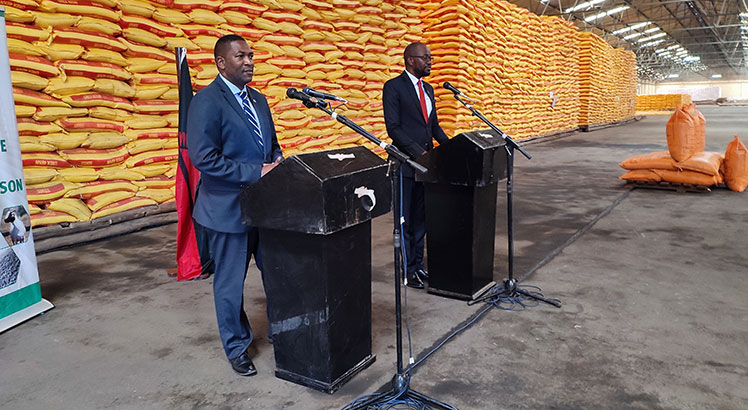AIP roll-out misses target
Ministry of Agriculture has missed the 40-day Affordable Inputs Programme (AIP) distribution deadline that President Lazarus Chakwera set as just 46 percent of beneficiaries have redeemed their inputs.
Briefing the media at the Smallholder Farmers Fertiliser Revolving Fund of Malawi (SFFRFM) offices in Kanengo, Lilongwe yesterday, Minister of Agriculture Sam Kawale attributed the failure to meet the deadline to foreign exchange scarcity and the 44 percent kwacha devaluation effected on November 9 this year.
Kawale has since said they hope to reach all 1.5 million beneficiaries with inputs before Christmas Day.
He said: “The programme has, for the past two weeks, been heavily affected by forex challenges and the devaluation of the kwacha.
“The devaluation has affected the budget of the programme while forex shortage has made it difficult to clear fertiliser from suppliers.”
During the launch of this year’s AIP in Kasungu on October 20, the President gave the Ministry of Agriculture 40 days to fully implement the programme which since its inception in 2020 has been rocked with implementation challenges.
Kawale said that as of yesterday, the government had only reached 46 percent of the beneficiaries, with most of them having accessed only one bag of fertiliser, NPK.

He said the ministry was committed to deliver the inputs within 40 days, but faced external factors that were beyond its control.
Kawale said the ministry engaged the President on the challenges and has been advised to engage Ministry of Finance and Economic Affairs and Reserve Bank of Malawi on how long it would take to resolve the forex challenges as well as provision of additional resources for the programme’s implementation.
He said the ministry was also tasked to check how much time it would need to implement the programme.
“Following consultations, the ministry is comfortable that it will finish the programme before Christmas,” said an upbeat Kawale, adding that they have the President’s blessing to finalise the process by December 25.
Providing a breakdown of the AIP status so far, he said government has secured 125 660 metric tonnes (MT) of fertiliser, representing 84 percent of the150 000MT needed for distribution.
Kawale further said a total of 58 041.45MT, translating to 1 160 829 bags, has already been delivered to selling points nationwide.
“The ministry is working on the financing and payments for the remaining 24 340MT, or 486 800 bags, of fertilisers to complete the 150 000MT, or 3 million bags, target,” he said.
Minister of Information and Digitisation Moses Kunkuyu, who accompanied Kawale during the briefing, said government is doing all it can to reach all the beneficiaries.
He said the good part is that the fertiliser is already in the country and what is remaining is distribution.
But in an interview later, Parliamentary Committee on Agriculture chairperson Sameer Suleman said the ministry cannot be giving excuses of devaluation and scarcity of forex now when it had all the time to secure fertiliser after Parliament passed the 2023/24 National Budget in April.
He said: “Clearly, the minister and his team have failed. They cannot come this time to say there is a shortfall. Government is creating another cycle of hunger by failing to implement the programme on time.
“There is a need to start looking at ways of addressing the perennial food insecurity.”
In a separate interview, Civil Society Agriculture Network board chairperson Herbert Chagona was pessimistic about the government meeting the December target, saying the ministry failed to reach half of the beneficiaries in 40 days.
He said the ministry should have procured fertiliser early, as the National Budget was passed early to accommodate such key procurements.
Members of Parliament from both sides of the House on Tuesday took turns to express their frustrations over AIP implementation challenges in their respective constituencies.
In February this year, Chakwera promised a timely AIP and directed that procurement processes should be done by end June 2023 so that people start accessing inputs early July 2023.
The AIP has faced implementation challenges over the years, with the Donor Committee on Agriculture and Food Security in Malawi urging the government to rethink the allocations to the AIP which consume over half of the funding to the sector.





